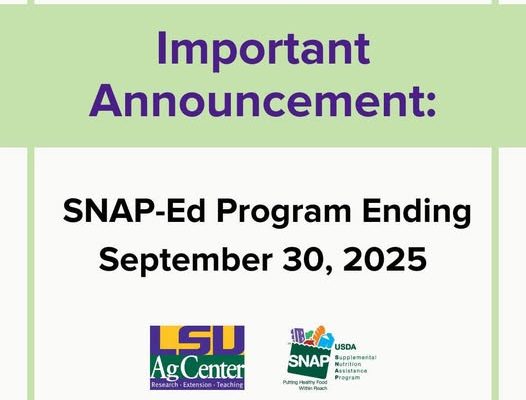End of an Era: LSU AgCenter Announces Discontinuation of SNAP-Ed Program After 30 Years Due to Federal Funding Cuts
After more than three decades of dedicated service, the LSU AgCenter has announced that its SNAP-Ed program will be discontinued as of September 30, 2025, due to changes in federal funding. This decision marks the end of a vital chapter in Louisiana’s public health and nutrition education efforts, as SNAP-Ed has played an instrumental role in helping thousands of residents live healthier lives through comprehensive nutrition education and community support initiatives.
The SNAP-Ed program has been a cornerstone of the LSU AgCenter’s mission to improve health and well-being across Louisiana’s diverse communities. For over 30 years, this initiative provided education and resources designed to promote healthy eating habits, physical activity, and better lifestyle choices among low-income individuals and families. It was not just a program but a partnership between educators, community organizations, local governments, and countless residents committed to building stronger, healthier communities across the state.
The announcement of the program’s discontinuation came with a heavy heart from the LSU AgCenter SNAP-Ed team, who expressed deep gratitude for the opportunity to serve Louisiana’s citizens. The team acknowledged the overwhelming support they have received from partners, stakeholders, and community members over the years. This collaboration was fundamental to the program’s success and its ability to touch so many lives.
Changes in federal funding have forced the LSU AgCenter to make this difficult decision, reflecting broader challenges faced by many public health and education programs nationwide. Federal budget adjustments have significant downstream effects on state-level initiatives, often impacting the most vulnerable populations who rely on such programs for critical support.
Throughout its existence, SNAP-Ed has been more than just an educational program; it has been a beacon of hope and empowerment for those striving to improve their health under often challenging circumstances. Its curriculum covered essential topics such as balanced nutrition, budgeting for healthy foods, food safety, and strategies for maintaining active lifestyles. The program’s outreach extended to schools, community centers, churches, and various public venues, making nutrition education accessible to people in their own neighborhoods.
The SNAP-Ed educators themselves have been the heart and soul of the program. Known for their dedication and compassion, these team members formed lasting relationships with the communities they served. Their work involved not only teaching but also listening, understanding cultural nuances, and adapting lessons to meet local needs. Many participants have attested to the positive impact these educators had on their lives, often crediting them with sparking lasting changes in family habits and health.
The program’s impact extends far beyond individual participants. By promoting healthy behaviors, SNAP-Ed contributed to reducing health disparities, combating obesity, and lowering the risk of chronic diseases such as diabetes and heart disease among Louisiana’s low-income populations. These outcomes not only improve quality of life but also alleviate long-term healthcare costs, making the program an invaluable investment in public health.
The LSU AgCenter has emphasized that despite the end of SNAP-Ed, its commitment to improving the health and well-being of Louisiana families remains steadfast. The team is actively working to ensure a smooth transition for ongoing projects, reaching out to partners and stakeholders to discuss how best to continue supporting the communities affected by this change.
In the face of this closure, there is a strong call to action for communities, organizations, and policymakers to find new ways to fill the gap left by SNAP-Ed’s discontinuation. The need for nutrition education and support has not diminished; if anything, the challenges faced by low-income families in maintaining healthy lifestyles have become more pronounced due to economic pressures and the lingering effects of the COVID-19 pandemic.
As the LSU AgCenter prepares for the program’s conclusion, it continues to provide updates and resources through its website, www.LSUAgCenter.com/SNAPEd, ensuring that participants and partners remain informed and supported during this transition period. The SNAP-Ed team encourages everyone who has been part of the mission to build a healthier Louisiana to stay engaged and help sustain the momentum toward better health outcomes statewide.
The end of the SNAP-Ed program marks a poignant moment for public health in Louisiana, highlighting the fragility of essential social support systems in the face of shifting political and financial landscapes. It also serves as a reminder of the critical importance of continued investment in nutrition education and preventive health initiatives.
Looking back on the program’s legacy, it is clear that SNAP-Ed has left an indelible mark on the health and lives of countless Louisianans. Its lessons and successes offer a blueprint for future programs aiming to address health inequities and empower communities through education and support.
As Louisiana moves forward without SNAP-Ed, the spirit of the program lives on in the healthier habits, increased awareness, and strengthened communities it helped create. The LSU AgCenter’s dedication to these goals persists, driving the search for innovative solutions and partnerships that can continue to promote wellness and nutrition education across the state.
The story of SNAP-Ed is ultimately one of hope, resilience, and collective effort. Though this chapter is closing, the impact of its work will continue to inspire and guide efforts to build a healthier, more equitable Louisiana for generations to come.



